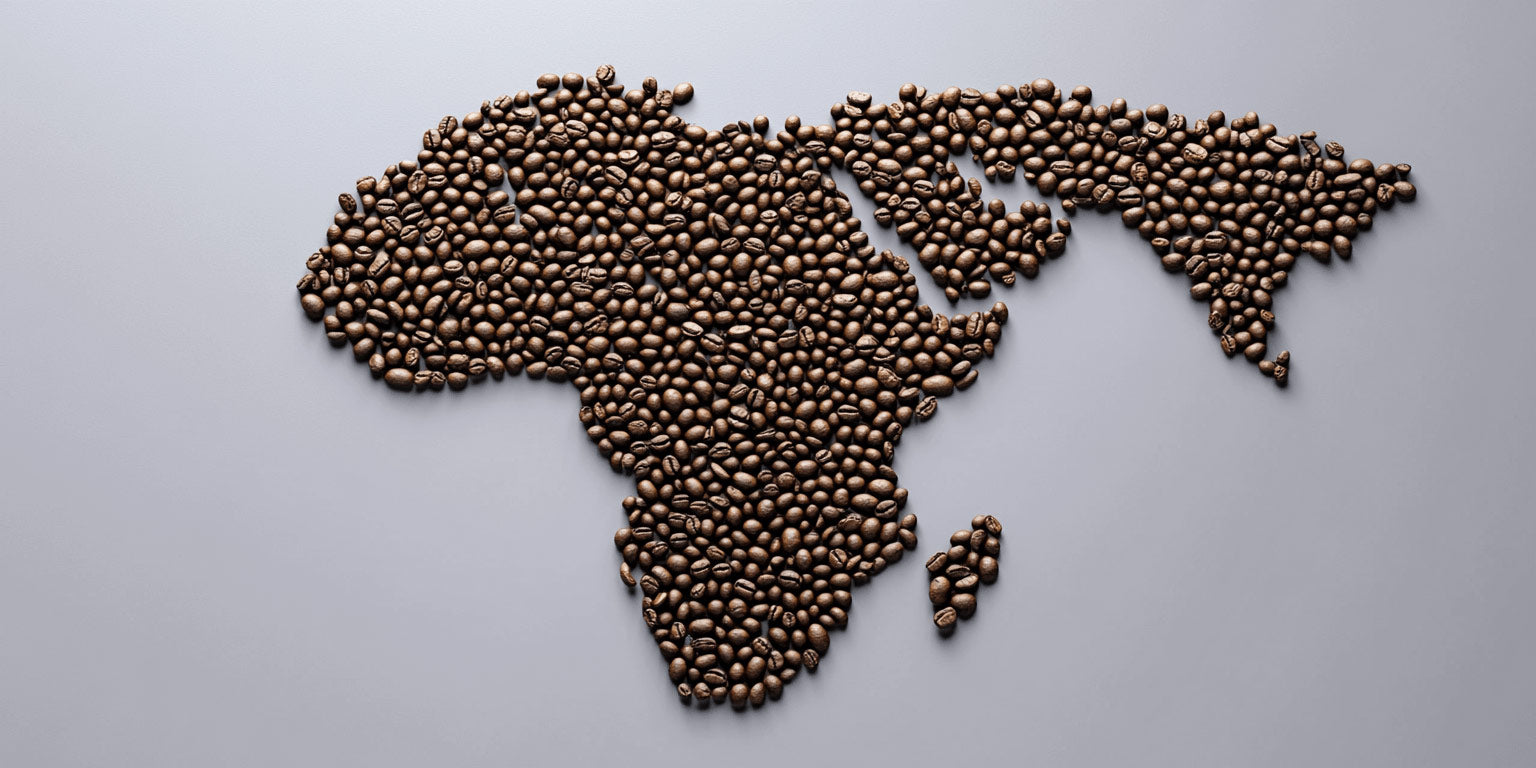Africa is the birthplace of coffee, with Ethiopia and Kenya being two of the most renowned coffee-producing countries on the continent. Coffee is an essential part of Africa's economy, providing livelihoods for millions of smallholder farmers.
The continent's diverse climates and rich soils contribute to its distinctive array of coffee profiles. In this profile by Mystic Monk Coffee, we celebrate the unique qualities of African coffees and their rich heritage.
History of Coffee in Africa
Coffee's history in Africa dates back centuries, with Ethiopia recognized as the origin of the coffee plant. The legend of Kaldi, a goat herder who discovered coffee, highlights the deep cultural roots of coffee in Ethiopia.
Coffee spread from Ethiopia to other parts of Africa and eventually to the world. Today, Africa remains a key player in the global coffee industry, known for its high-quality beans with immense varieties of flavor profiles.
Coffee Growing Regions
Africa's top coffee-growing regions, ordered from highest to lowest, include:
- Ethiopia
- Uganda
- Rwanda
- Kenya
- Tanzania
- Ivory Coast
- Burundi
- Guinea
- Democratic Republic of the Congo
- Cameroon
- Zambia
- South Africa
- Congo
Each country offers unique climatic and geographic conditions that produce an immense spectrum of incredible flavor profiles in its coffee beans. Travel your way through this vast continent by sipping coffee from every region.
Varieties of Coffee Beans
Most coffee farmed in Africa is made of Arabica and Robusta varieties. However, many wild variants continue to be discovered and even rediscovered, especially among Ethiopian coffees. For example, researchers found the Coffea stenophylla plant, which was once found growing exclusively in West Africa. Though not commercially available yet, it holds promise.
Other African nations produce impressive varieties as well. In the Ivory Coast, a small number of farmers grow the hybrid “Arabusta” coffee. It’s a cross-breed that balances the sweetness of Arabica with the hardiness of Robusta. The central drawback is that this variant grows much more slowly than either bean.
Cultivation and Harvesting Practices
African coffee farmers typically use traditional and sustainable farming methods to ensure high-quality beans. Shade-grown coffee is common, providing protection from direct sunlight and maintaining biodiversity. Harvesting is also often done by hand, allowing farmers to select only the ripest cherries. This meticulous process ensures the highest quality beans are harvested.
Processing Methods
Africa employs various coffee processing methods, but most employ dry processing methods, while a few may use a washed processing method. The washed process, involving fermentation and washing, highlights the coffee’s clean and bright acidity. Dry processing, where beans dry inside the cherry, imparts fruity and wine-like characteristics.
Flavor Profile and Tasting Notes
African coffee is celebrated for its bright acidity, complex flavors, and vibrant profiles. Typical tasting notes include citrus, berries, floral, and wine-like undertones. The continent’s diverse growing regions contribute to a variety of flavor profiles, appealing to different tastes. Overall, African coffees consistently offer a high-quality and enjoyable drinking experience.
Ethiopia's Yirgacheffe region produces coffee with bright acidity, fruity flavors, and floral notes. Kenya's high-altitude farms yield beans with vibrant acidity and delicious berry-like flavors. Those are just a few, but there are yet many more exciting brews from across the continent to discover.
Famous Coffee Brands and Cooperatives
A few notable African coffee brands include Ethiopian Yirgacheffe Coffee, Kenyan AA, and Ugandan Bugisu. These brands are recognized for their commitment to quality and sustainable practices.
In addition, cooperatives like Oromia Coffee Farmers in Ethiopia, Kenya’s Cooperative Coffee Exporters, and Kaffa Forest Coffee Farmers’ Cooperative Union all support local farmers in their respective countries.
They provide resources and promote fair trade practices. These organizations also help maintain high standards and ethical production in the African coffee industry, ensuring each country’s long-term success.
Challenges and Sustainability Efforts
The African coffee industry faces challenges such as climate change, disease, and fluctuating market prices. To address these issues, significant efforts are being made towards sustainability and innovation.
Initiatives include promoting organic and agroforestry farming, growing more disease-resistant coffee varieties, and implementing fair trade practices. These efforts aim to mitigate these future challenges and secure a sustainable future for African coffee.
Conclusion
African coffee has an immensely rich history, comes from a range of diverse regions, and is produced through meticulous cultivation practices. The continent's dedication to quality and sustainability ensures its continued prominence in the global coffee market.
African coffee remains a favorite for its bright acidity and complex array of flavors, depending on its country and region. However, the future of African coffee shows changes on the horizon, but there are huge ongoing efforts to innovate and sustain this cherished industry.
Read more

The islands of the Caribbean are known for growing some of the best coffees in the world. Each one offers unique and diverse flavor profiles and textures, made in some of the best-growing condition...

While China is traditionally known for its exceptional teas, it has also become an emerging player in the global coffee market. Previously, it was known for producing a cheaper, lower-quality produ...

